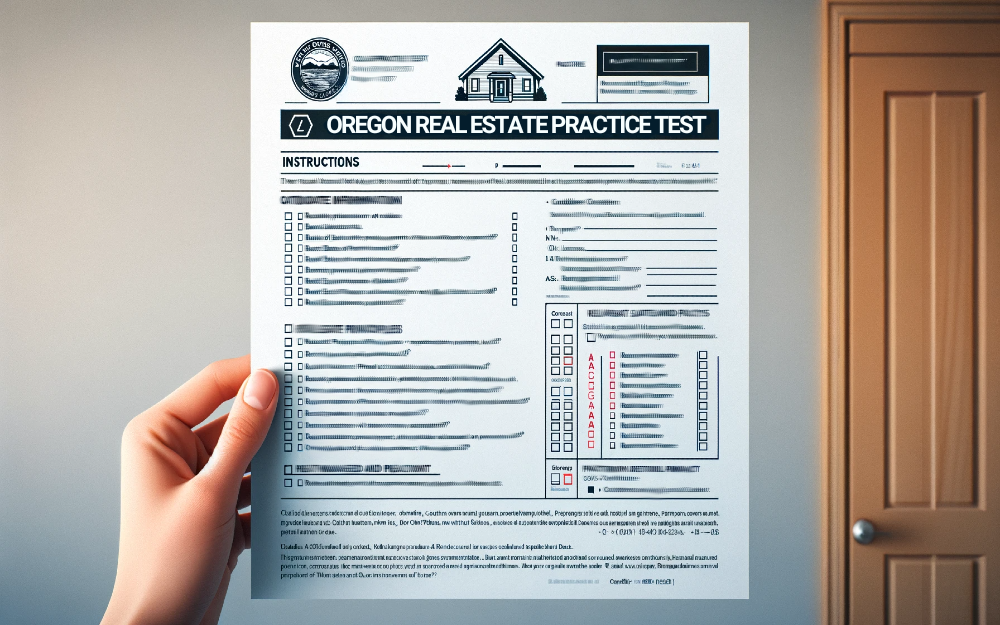
Determine your answer, then click the arrow to see the correct response.
What Does "FSBO" Stand for in Real Estate?
A) Full-Service Brokerage Offer
B) For Sale By Owner
C) Federal Sale and Brokerage Office
D) Financial Services and Brokerage Organization
Correct Answer: B) For Sale By Owner
Explanation: FSBO stands for “For Sale By Owner,” which means the property is being sold directly by the owner without the representation of a real estate agent.
What Is "Reverse Mortgage"?
A) A loan that must be repaid in full upon the sale of the property
B) A type of mortgage for first-time homebuyers
C) A loan available to homeowners 62 years or older that allows them to convert part of the equity in their home into cash
D) A mortgage with an adjustable interest rate
Correct Answer: C) A loan available to homeowners 62 years or older that allows them to convert part of the equity in their home into cash
Explanation: A reverse mortgage is a type of loan for homeowners aged 62 or older that allows them to convert part of the equity in their home into cash without having to sell the home or take on additional monthly bills.
James, a Real Estate Agent in Oregon, Lists a Property for Sale and Receives an Offer From a Buyer. The Buyer’s Offer Includes a Clause Stating That They Will Only Proceed With the Purchase if They Can Secure Financing Within 30 Days. What Must James Ensure Regarding This Contingency?
A) James can ignore the clause if the seller accepts the offer.
B) James must ensure the contingency is clearly outlined and agreed upon in the sales contract.
C) James should automatically remove the clause to simplify the contract.
D) James should guarantee the financing herself.
Correct Answer: B) James must ensure the contingency is clearly outlined and agreed upon in the sales contract.
Explanation: In Oregon, any contingencies, such as financing, must be clearly stated and agreed upon in the sales contract to protect both the buyer and the seller and to ensure legal enforceability.
A Buyer in Oregon Discovers That a Property They Purchased Has an Undisclosed Easement That Significantly Affects Their Use of the Property. What Is the Buyer's Legal Recourse?
A) None, as the sale is final
B) File a lawsuit for damages based on failure to disclose
C) Request a refund of the purchase price
D) Automatically nullify the sale
Correct Answer: B) File a lawsuit for damages based on failure to disclose
Explanation: Under Oregon law, sellers are required to disclose known easements. Failure to do so can result in the buyer filing a lawsuit for damages due to non-disclosure.
What Does "Underwriting" Refer to in Real Estate Transactions?
A) The process of signing a lease
B) The process of evaluating and determining the risk of a loan application
C) The negotiation of sale terms
D) The management of rental properties
Correct Answer: B) The process of evaluating and determining the risk of a loan application
Explanation: Underwriting in real estate involves assessing the risk and determining the eligibility of a borrower for a mortgage loan. It includes evaluating the borrower’s credit history, income, and the value of the property.
In Oregon, What Is Required for a Valid Conveyance of Real Property?
A) A verbal agreement between the buyer and seller
B) A written instrument signed by the grantor
C) A handshake witnessed by a third party
D) A formal court proceeding
Correct Answer: B) A written instrument signed by the grantor
Explanation: According to Oregon Revised Statutes, a valid conveyance of real property requires a written instrument, such as a deed, that is signed by the grantor and properly recorded.
Olivia, a Licensed Real Estate Broker in Oregon, Is Representing a Buyer. The Seller’s Agent Offers Olivia a Bonus if Her Client Accepts the Seller’s Terms. What Must Olivia Do To Comply With Oregon’s Real Estate Regulations?
A) Accept the bonus without informing her client.
B) Disclose the bonus offer to her client and obtain written consent before accepting it.
C) Decline the bonus offer immediately.
D) Inform the seller that bonuses are not allowed.
Correct Answer: B) Disclose the bonus offer to her client and obtain written consent before accepting it.
Explanation: Oregon law requires real estate brokers to disclose any additional compensation or incentives to their clients and obtain written consent before accepting them to ensure transparency and avoid conflicts of interest.
A Homeowner in Oregon Refinances Their Mortgage to a New Loan Amount of $300,000 at an Annual Interest Rate of 3.5% Over a 25-Year Term. What Will Be the New Monthly Mortgage Payment (Principal and Interest Only)?
A) $1,200.25
B) $1,241.81
C) $1,279.34
D) $1,401.72
Correct Answer: B) $1,241.81
Explanation: Using the mortgage payment formula, P = $300,000, r = 0.035 / 12 = 0.002917, and n = 2512 = 300. M = 300,000[0.002917(1+0.002917)^300] / [(1+0.002917)^300 – 1] ≈ $1,241.81.
A Commercial Property in Oregon Is Valued at $1,800,000 and Has an Annual Net Operating Income (NOI) of $144,000. What Is the Capitalization Rate (Cap Rate) for This Property?
A) 6%
B) 7%
C) 8%
D) 9%
Correct Answer: B) 8%
Explanation: The capitalization rate is calculated by dividing the annual net operating income (NOI) by the property value. Cap rate = $144,000 / $1,800,000 = 0.08 or 8%.
Liam, a Licensed Real Estate Agent in Oregon, Co-Mingles Client Funds With His Personal Funds in a Single Account. What Are the Possible Consequences of This Action Under Oregon Real Estate Laws?
A) There are no consequences as long as the funds are accounted for
B) Liam could face disciplinary actions including suspension or revocation of his license
C) Liam must only separate the funds during audits
D) Liam is required to pay a fine but can continue practicing
Correct Answer: B) Liam could face disciplinary actions including suspension or revocation of his license
Explanation: Oregon law mandates that real estate agents must keep client funds in a separate trust account. Co-mingling client funds with personal funds is a violation that can lead to disciplinary actions such as suspension or revocation of the agent’s license.
